
In this update:
- Administration Updates
- Legislative Updates
- Election Updates
- A Look at the Week Ahead
- Fundraising Opportunities
Administration Updates
Evers signs order creating Green Ribbon Commission
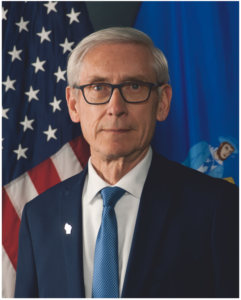 Governor Tony Evers signed an executive order this week establishing a commission that will advise on creating Wisconsin’s first-ever Green Innovation Fund. Commonly referred to as a “green bank,” the fund will be used to “leverage public and private financing to invest in projects that provide environmental and clean energy solutions to businesses, reduce pollution, lower energy costs for families, and expand access to clean, affordable energy options.” On signing the executive order, Gov. Evers said the Green Innovation Fund would help move the state towards its clean energy goals, enable the state to leverage federal funding under the Inflation Reduction Act, and make Wisconsin a leader in innovative technology and clean energy. “This Commission is an important step forward in doing that and to ensuring this Fund is successful in building a sustainable, clean energy economy for the future, ” said Gov. Evers.
Governor Tony Evers signed an executive order this week establishing a commission that will advise on creating Wisconsin’s first-ever Green Innovation Fund. Commonly referred to as a “green bank,” the fund will be used to “leverage public and private financing to invest in projects that provide environmental and clean energy solutions to businesses, reduce pollution, lower energy costs for families, and expand access to clean, affordable energy options.” On signing the executive order, Gov. Evers said the Green Innovation Fund would help move the state towards its clean energy goals, enable the state to leverage federal funding under the Inflation Reduction Act, and make Wisconsin a leader in innovative technology and clean energy. “This Commission is an important step forward in doing that and to ensuring this Fund is successful in building a sustainable, clean energy economy for the future, ” said Gov. Evers.
Legislative Updates
JFC rejects agencies’ proposals, files new objection
The Joint Committee on Finance (JFC) voted along party lines this week to reject five different proposals from state agencies including DNR, DHS, and WEDC. The DNR had requested $4 million from the Knowles-Nelson Stewardship Fund to help pay for part of the Pelican River Forest project, the largest land conservation effort in state history. Republican JFC members said the project had been mismanaged by the DNR after it failed to tell the Natural Resources Board prior to a key vote that two towns located along the conservation project passed resolutions opposing the project. “The DNR should be embarrassed. They should be ashamed for what they did on this project,” JFC Assembly Co-chair Mark Born (R-Beaver Dam) said.
Another Republican, Sen. Mary Felzkowski of Irma, said the state needed to be careful about continuing to purchase more land because it already has 5.9 million acres of public land and conservation easements, which is having a negative impact on economic development. “If you want northern Wisconsin to be economically viable, people to be able to purchase land and build homes and enjoy it and live … We have areas that are going broke and we continue to take the tools away from them to allow them to be economically viable,” Sen. Felzkowski said.
Democrats supported the $4 million request and were critical of the passive review process that allowed the JFC to reject the DNR’s request in the first place. Sen. LaTonya Johnson (D-Milwaukee) said allowing for anonymous objections creates a secretive process the public doesn’t understand. Her Assembly counterpart, Rep. Evan Goyke (D-Milwaukee), pointed out that taking the locals opinions into account should be something lawmakers do on all occasions, not just when it aligns with their own interests. “I hope that you disempower folks here to secretly object and uphold or stall the process, or that you put a back-end timeline by which this committee must act,” Rep. Goyke said. “I can appreciate locals that object to projects, but please look at the other side of the coin, when there are locals that deeply and passionately support a project, but it’s blocked in secret by one member of this committee.”
Other proposals rejected along party lines by the JFC include:
- A request from DHS to spend $17.5 million in already-appropriated money to encourage people on Medical Assistance to get the COVID-19 vaccine.
- A request from DNR to fund a four-year project position to oversee the collection and dissemination of water data usage as required under the Great Lakes Compact. JFC Senate Co-chair Howard Marklein (R-Spring Green) said the position could be included in the state budget if the committee supported creating it.
- A request from WEDC to approve $288,000 in tax credits through the historic tax credit program to renovate the Beta Theta Pi fraternity house on UW-Madison’s campus.
- A request from DHS to approve its plan to resolve $18 million in deficits in two accounts from 2021-22. According to the LFB, the committee can address the deficits during normal budget deliberations.
New Objection
In addition to its s13.10 session, the JFC also informed DHS this week that one of its members anonymously objected to the agency’s plan to spend $8 million in opioid settlement funds. That means the JFC must now meet to consider the proposal, although there is no deadline for it to do so. The DHS plan that was objected to calls for $1.5 million to continue its Narcan program, $500,000 for fentanyl test strip distribution, $1 million for the EMS Leave Behind Program, $1 million to distribute the Narcan and fentanyl test strips to law enforcement agencies, and $3 million for one-time capital projects that grow “prevention, harm reduction, treatment, and/or recovery services” across the state.
In a joint statement following the objection, JFC Co-Chairs Mark Born and Howard Marklein said there was limited information on the effectiveness of previously spent opioid settlement funds. “The proposal for the new round of funding appears to invest in initiatives from the last round that have not yet proven effective,” they said. “The committee will continue conversations with stakeholders to ensure these funds, which won’t arrive in the state until July, are put to the most effective use.” Also commenting on the objection, Gov. Evers wrote in a tweet that it was “breathtaking” that “Republicans in the Legislature have … singlehandedly obstructed millions in settlement funds that we could use today to fight [the opioid crisis].”
JFC budget process update
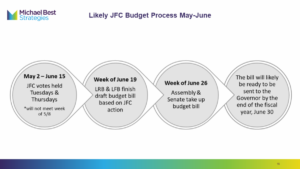
The next six weeks will be key to crafting the state budget. See below JFC’s expected timeline for crafting the FY 2023-25 budget.
- Voting should begin on Tuesday, May 2nd and continue Tuesdays and Thursdays thereafter.
- The Committee would not meet the week of May 8th.
- The last committee vote should be scheduled for Thursday, June 15th.
- The week of June 19th, the Legislative Reference Bureau & Legislative Fiscal Bureau should finish the drafting of the budget bill based on the Finance Committee action.
- Both the Assembly and Senate would take up the budget bill the week of June 26th, delivering the bill to the Governor before the end of the fiscal year.
Assembly and Senate hold floor sessions
Both chambers of the state Legislature held floor sessions this week. The Assembly was on the floor Tuesday while the Senate held its floor session Wednesday. Highlights of the Assembly session include passage of two pieces of legislation that would prohibit state agencies and local governments from restricting the use of devices or vehicles based on its energy source. In the upper chamber, the Senate confirmed the appointment of DATCP Secretary Randy Romanski, as well as the appointment of DOR Secretary Peter Barca. Additional details on the floor sessions are below.
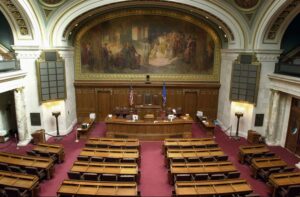 Assembly
Assembly
Two pieces of legislation that would prohibit bans on gas-powered vehicles or devices passed the Assembly along party lines. AB 141 would prevent state agencies and governments from restricting the use of devices such as lawnmowers or leaf blowers based on its energy source while AB 142 would do the same for motor vehicles. Rep. Ellen Schutt (R-Clinton), the author of both bills, said the laws are needed to protect Wisconsinites against government overreach. “I don’t believe government at any level has the right to tell you if you want to buy an electric or gas powered lawnmower, or what kind of kitchen appliance you want in your home,” Rep. Schutt said. “And I think this protects you to make that choice or that preference of what you prefer.” Democrats called the proposals unnecessary and Gov. Evers said he wasn’t sure whether he would veto the measures should the Senate pass it. Commenting on his administration’s push for electric cars across the state, Gov. Evers said “We’re heading in that direction. We will do it on a better pace than just saying ‘Tomorrow we can’t have that.’ That’s the overall goal, but banning it is not a good policy decision.”
Other bills of note passed by the Assembly this week include:
- AB 36, which would create a “fast-pass” for certain sexual assault kits to expedite state crime lab processing;
- AB 49, which would allow people with disabled parking privileges to park on UW System campuses; and
- SB 76, which would increase penalties for carjacking.
The Assembly is scheduled to be back on the floor next week Tuesday, April 25 at 12 PM where it will act on legislation prohibiting local governments from using public funds for guaranteed income programs. The Assembly will also vote on bills relating to unemployment insurance and BadgerCare Plus eligibility.
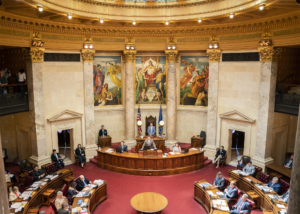 Senate
Senate
Keeping in line with a prediction earlier this year from Majority Leader Devin LeMahieu (R-Oostburg) that the Senate would act on Gov. Evers’ secretary appointments, the Senate confirmed two of the governor’s appointees this week. DATCP Secretary Randy Romanski and DOR Secretary Peter Barca were unanimously confirmed by the Senate, marking the 4th and 5th cabinet-level positions to be confirmed since the governor’s re-election.
Other bills of note passed by the Senate this week include:
- AB 55, which would stiffen fines and imprisonment penalties for reckless driving; and
- SB 177, which would make it easier for a plaintiff to recoup attorneys’ fees in open records lawsuits.
The Senate will not be on the floor next week.
Vos weighs in on budget proposals
 Assembly Speaker Robin Vos recently spoke on two of Representative John Macco’s (R-Ledgeview) proposals regarding shared revenue and the state income tax. Rep. Macco’s first proposal would transfer 20 percent of the sales tax to a new segregated fund for local government aid, resulting in nearly $1.6 billion in 2024-25. This is a slight alteration of the idea that lawmakers have suggested that would dedicate 1 cent of the state’s 5-cent sales tax to shared revenue. Rep. Macco’s proposal includes a minimum per capita payment for towns, villages, cities, and counties. Towns would get a minimum of $65 million in calendar year 2024, cities and villages would get a minimum of $75 million, and counties a minimum of $57.5 million. It further includes a provision that if any municipality decreased how much of its budget went to law enforcement, fire or emergency responders, its state aid would be cut. In response, Speaker Vos stated, “They didn’t bring it to the caucus for approval, so that is well-meaning legislators bringing their idea forward. I think there is a large group of legislators who are trying to work on a bipartisan package. That’s our hope.” He also noted that there is a chance some parts of the proposal could be included, saying, “But their proposal is not a starting point, it’s not an ending point, it’s just one more idea to add to the mix that hopefully once we get a final deal, some of that can be included. But no guarantees.”
Assembly Speaker Robin Vos recently spoke on two of Representative John Macco’s (R-Ledgeview) proposals regarding shared revenue and the state income tax. Rep. Macco’s first proposal would transfer 20 percent of the sales tax to a new segregated fund for local government aid, resulting in nearly $1.6 billion in 2024-25. This is a slight alteration of the idea that lawmakers have suggested that would dedicate 1 cent of the state’s 5-cent sales tax to shared revenue. Rep. Macco’s proposal includes a minimum per capita payment for towns, villages, cities, and counties. Towns would get a minimum of $65 million in calendar year 2024, cities and villages would get a minimum of $75 million, and counties a minimum of $57.5 million. It further includes a provision that if any municipality decreased how much of its budget went to law enforcement, fire or emergency responders, its state aid would be cut. In response, Speaker Vos stated, “They didn’t bring it to the caucus for approval, so that is well-meaning legislators bringing their idea forward. I think there is a large group of legislators who are trying to work on a bipartisan package. That’s our hope.” He also noted that there is a chance some parts of the proposal could be included, saying, “But their proposal is not a starting point, it’s not an ending point, it’s just one more idea to add to the mix that hopefully once we get a final deal, some of that can be included. But no guarantees.”
Rep. Macco’s second proposal would move the state to two income brackets. On this, the Speaker shared that his caucus has had almost no discussion on income tax, but that Rep. Macco’s plan likely will not be the adopted plan. He stated, “I think it’s fair to say that universally we want to have as broad a tax cut as we possibly can, we prefer to be flatter,” noting Gov. Tony Evers wants more targeted tax relief. “Representative Macco should go and talk to the governor if he wants, if he thinks he can convince the governor. I am more than willing to work with him on that. But I’m not so certain that his plan in the end will be the one that we adopt. But the idea of having a flatter tax code is one thing we’re all in favor of,” Speaker Vos said.
The Speaker also spoke on the Milwaukee Brewers’ stadium proposal. He shared that it probably is not realistic to expect the state to bear all the financial weight to keep the Brewers here. He stated, “I think it’s fair to say that most people around the state would expect that they would have some kind of a participatory role. Has that been defined? No. Has a number, you know, been arrived at? No. But the idea of saying that the state is going to bear all the responsibility for a local project, probably not realistic either.” He further noted that it is unlikely his caucus will back dedicating state money to the Brewers’ stadium beyond income and sales taxes that are generated from the team being in Wisconsin, and that Gov. Evers’ proposal to direct $290 million in one-time state tax dollars to the district board is dead.
Election Updates
Tiffany eyeing U.S. Senate run
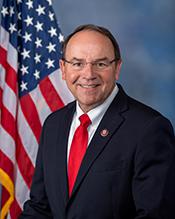 This week, Congressman Tom Tiffany (R) of Wisconsin’s 7th Congressional District signaled a possible 2024 Senate run by the purchase of two domain names, “thomastiffanyforsenate.com” and “tomtiffany4senate.com”. He shared that his decision to run or not will hinge largely on what he feels is “best for the state of Wisconsin.” On his possible future opponent Senator Baldwin, he stated, “You’ve got a career politician in Tammy Baldwin. Why do we have the highest inflation since the 1970s? Cost of living has gone through the roof for people in Wisconsin. Why do you have the high energy costs that are going up once again? It’s because of career politicians like Tammy Baldwin.” Rep. Tiffany concluded by saying, “There needs to be changes made.”
This week, Congressman Tom Tiffany (R) of Wisconsin’s 7th Congressional District signaled a possible 2024 Senate run by the purchase of two domain names, “thomastiffanyforsenate.com” and “tomtiffany4senate.com”. He shared that his decision to run or not will hinge largely on what he feels is “best for the state of Wisconsin.” On his possible future opponent Senator Baldwin, he stated, “You’ve got a career politician in Tammy Baldwin. Why do we have the highest inflation since the 1970s? Cost of living has gone through the roof for people in Wisconsin. Why do you have the high energy costs that are going up once again? It’s because of career politicians like Tammy Baldwin.” Rep. Tiffany concluded by saying, “There needs to be changes made.”
Commenting on the potential field of GOP candidates, Arik Wolk, Rapid Response Director for the Democratic Party of Wisconsin, put out a press release that read in part “From election-denying Tom Tiffany gearing up to run for Senate, to far-right David Clarke attacking Mike Gallagher for being soft on immigration, to another out-of-touch candidate meeting with national Republicans, we’re looking at another classic brutal primary fight from Wisconsin Republicans.”
Senator Tammy Baldwin, who has already announced she will be running for reelection, is the two-term incumbent Republicans will face in 2024.
- Senator Baldwin was first elected to the Senate in 2012, when she defeated former Governor Tommy Thompson with 51.5% of the vote.
- In 2018, Sen. Baldwin beat former State Senator Leah Vukmir by almost 11 points.
- According to her most recent campaign finance report, Sen. Baldwin raised over $2.1 million, spent almost $1.3 million and had nearly $3.9 million in the bank to end the last quarter. In contrast, Rep. Tiffany raised $37,195, spent $40,575, and had $336,291 in the bank.
A Look at the Week Ahead
Upcoming Floor Calendar
Tuesday, April 25
- Assembly Floor Session scheduled for 12:00 pm in the Assembly Chambers
The Senate will NOT be on the floor next week.
Fundraising Opportunities
A list of all upcoming fundraiser opportunities can be found by clicking the button below. For any questions or more information, please do not hesitate to contact your Michael Best Strategies contact.



